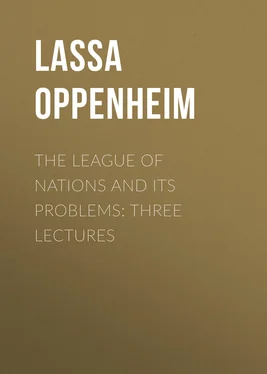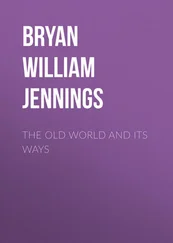Lassa Oppenheim - The League of Nations and Its Problems - Three Lectures
Здесь есть возможность читать онлайн «Lassa Oppenheim - The League of Nations and Its Problems - Three Lectures» — ознакомительный отрывок электронной книги совершенно бесплатно, а после прочтения отрывка купить полную версию. В некоторых случаях можно слушать аудио, скачать через торрент в формате fb2 и присутствует краткое содержание. Жанр: foreign_prose, foreign_antique, на английском языке. Описание произведения, (предисловие) а так же отзывы посетителей доступны на портале библиотеки ЛибКат.
- Название:The League of Nations and Its Problems: Three Lectures
- Автор:
- Жанр:
- Год:неизвестен
- ISBN:нет данных
- Рейтинг книги:4 / 5. Голосов: 1
-
Избранное:Добавить в избранное
- Отзывы:
-
Ваша оценка:
- 80
- 1
- 2
- 3
- 4
- 5
The League of Nations and Its Problems: Three Lectures: краткое содержание, описание и аннотация
Предлагаем к чтению аннотацию, описание, краткое содержание или предисловие (зависит от того, что написал сам автор книги «The League of Nations and Its Problems: Three Lectures»). Если вы не нашли необходимую информацию о книге — напишите в комментариях, мы постараемся отыскать её.
The League of Nations and Its Problems: Three Lectures — читать онлайн ознакомительный отрывок
Ниже представлен текст книги, разбитый по страницам. Система сохранения места последней прочитанной страницы, позволяет с удобством читать онлайн бесплатно книгу «The League of Nations and Its Problems: Three Lectures», без необходимости каждый раз заново искать на чём Вы остановились. Поставьте закладку, и сможете в любой момент перейти на страницу, на которой закончили чтение.
Интервал:
Закладка:
VI. It is for this reason that the outbreak of the present war is epoch-making, because it has become apparent that, whatever may be the war aims of the belligerents, at bottom this World War is a fight between the ideal of democracy and constitutional government on the one hand, and autocratic government and militarism on the other. Everywhere the conviction has become prevalent that things cannot remain as they were before the outbreak of the present war, and therefore the demand for a League of Nations, or—I had better say—for a new League of Nations to take the place of that which has been in existence for about 400 years, has arisen.
Now what is new in the desired new League of Nations?
Firstly, this new League would be founded upon a solemn treaty, whereas the League of Nations hitherto was only based upon custom.
Secondly, for the purpose of making war rarer or of abolishing it altogether, this new League of Nations would enact the rule that no State is allowed to resort to arms without previously having submitted the dispute to an International Court or a Council of Conciliation.
Thirdly, this new League of Nations would be compelled to create some kind of organisation for itself, because otherwise it could not realise its purpose to make war rarer or abolish it altogether.
VII. The demand for a new League of Nations is universal, for it is made, not only everywhere in the allied countries, but in the countries of the Central Powers, and it will surely be realised when the war is over, at any rate to a certain extent. It is for this reason that the present World War has not only not destroyed so-called Internationalism, but has done more for it than many years of peace could have done.
What is Internationalism?
Internationalism is the conviction that all the civilised States form one Community throughout the world in spite of the various factors which separate the nations from one another; the conviction that the interests of all the nations and States are indissolubly interknitted, and that, therefore, the Family of Nations must establish international institutions for the purpose of guaranteeing a more general and a more lasting peace than existed in former times. Internationalism had made great strides during the second part of the nineteenth century on account of the enormous development of international commerce and international communication favoured by railways, the steamship, the telegraph, and a great many scientific discoveries and technical inventions. But what a disturbing and destroying factor war really is, had not become fully apparent till the present war, because this is a world war which interferes almost as much with the welfare of neutrals as with the welfare of belligerents. It has become apparent during the present war that the discoveries and developments of science and technology, which had done so much during the second half of the nineteenth century for the material welfare of the human race during peace, were likewise at the disposal of belligerents for an enormous, and hitherto unthought-of, destruction of life and wealth. It is for this reason that in the camp of friend and foe, among neutrals as well as among belligerents, the conviction has become universal that the conditions of international life prevailing before the outbreak of the World War must be altered; that international institutions must be established which will make the outbreak of war, if not impossible, at any rate only an exceptional possibility. The demand for a new League of Nations has thus arisen and peremptorily requires fulfilment.
VIII. However, in considering the demand for a new League of Nations, it is necessary to avoid confusing nations with States. It should always be remembered that, when we speak of a League of Nations, we do not really mean a League of Nations but a League of States. It is true that there are many States in existence which in the main are made up of one nation, although fractions of other nations may be comprised in them. But it is equally true that there are some States in existence which include members of several nations. Take as an example Switzerland which, although only a very small State, nevertheless comprises three national elements, namely German, French, and Italian. Another example is the British Empire, which is a world empire and comprises a number of different nations.
That leads me to the question: What is a nation?
A nation must not be confounded with a race. A nation is a product of historical development, whereas a race is a product of natural growth. One speaks of a nation when a complex body of human beings is united by living in the same land, by the same language, the same literature, the same historical traditions, and the same general views of life. All nations are a mixture of several diverse racial elements which in the course of historical development have to a certain extent been united by force of circumstances. The Swiss as a people are politically a nation, although the component parts of the population of Switzerland are of different national characters and even speak different languages. Historical development in general, and in many cases force in particular, have played a great part in the blending of diverse racial elements into nations; just as they have played a great part in the building up of States. The demand that every nation should have a separate State of its own—the ideal of the so-called national State—appears very late in history; it is a product of the last two centuries, and it was not till the second half of the nineteenth century that the so-called principle of nationality made its appearance and gained great influence. It may well be doubted whether each nation, be it ever so small, will succeed in establishing a separate State of its own, although where national consciousness becomes overwhelmingly strong, it will probably in every case succeed in time either in establishing a State of its own, or at any rate in gaining autonomy. Be that as it may, it is a question for the future; so much is certain, what is intended now to be realised, is not a League of Nations, but a League of States, although it is called a League of Nations.
IX. However, no League of Nations is possible unless the Central Powers, and Germany in especial, are utterly defeated during the World War, and that for two reasons.
One reason is that a great alteration of the map of Europe is an absolutely necessary condition for the satisfactory working of a League of Nations. Unless an independent Poland be established; unless the problem of Alsace-Lorraine be solved; unless the Trentino be handed over to Italy; unless the Yugo-Slavs be united with Servia; unless the Czecho-Slovaks be freed from the Austrian yoke; and unless the problem of Turkey and the Turkish Straits be solved, no lasting peace can be expected in Europe, even if a League of Nations be established.
The other reason is that, unless Germany be utterly defeated, the spirit of militarism, which is not compatible with a League of Nations, will remain a menace to the world.
What is militarism? It is that conception of the State which bases the power of the State, its influence, its progress, and its development exclusively on military force. The consequence is that war becomes part of the settled policy of a militarist State; the acquisition of further territory and population by conquest is continually before the eyes of such a Government; and the condition of peace is only a shorter or longer interval between periods of war. A military State submits to International Law only so long as it serves its interests, but violates International Law, and particularly International Law concerning war, wherever and whenever this law stands in the way of its military aims. The whole history of Prussia exemplifies this. Now in a League of Nations peace must be the normal condition. If war occurs at all within such a League, it can only be an exceptional phase and must be only for the purpose of re-establishing peace. It is true a League of Nations will not be able entirely to dispense with military force, yet such force appears only in the background as an ultima ratio to be applied against such Power as refuses to submit its disagreements with other members of the League either to an International Court of Justice or an International Council of Conciliation.
Читать дальшеИнтервал:
Закладка:
Похожие книги на «The League of Nations and Its Problems: Three Lectures»
Представляем Вашему вниманию похожие книги на «The League of Nations and Its Problems: Three Lectures» списком для выбора. Мы отобрали схожую по названию и смыслу литературу в надежде предоставить читателям больше вариантов отыскать новые, интересные, ещё непрочитанные произведения.
Обсуждение, отзывы о книге «The League of Nations and Its Problems: Three Lectures» и просто собственные мнения читателей. Оставьте ваши комментарии, напишите, что Вы думаете о произведении, его смысле или главных героях. Укажите что конкретно понравилось, а что нет, и почему Вы так считаете.












